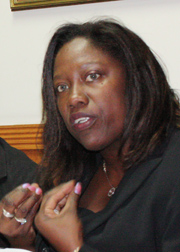
ST. VINCENT: – The Boundaries Commission has agreed not to publish any new reports until the September 30 trial of issued relating to its work, lawyers for opposition leader Arnhim Eustace said on Friday, Sept 3.
The announcement puts to rest New Democratic Party (NDP) fears that the Commission was trying to circumvent the High Court order which prevents the publishing of the Commission’s July 9 report until a trial of constitutional issued raised by Eustace.
“We accept that undertaking and at least we applaud them (the Boundaries Commission) for giving the undertaking not to publish any other order. … But we maintain that the legality and the unconstitutionality that came to the Commission runs from the root. So, it goes from birth to the grave, as it were,” Nicole Sylvester, one of the lawyers representing Eustace, said at a press conference on Friday.
“So, at least, we can now feel reassured that rule of law is alive and kicking and reassured that the issue at hand will actually get a fair hearing and we all will await the outcome of the court, which is what we have always wanted,” Sylvester said.
Selwyn Jones represents Eustace on the commission, which also comprises Arthur Williams, the representative of Prime Minister Dr. Ralph Gonsalves and Chairman Auldric Williams, who was appointed by the Governor General, in keeping with the law.
Sylvester said Jones informed the NDP’s lawyers that the Commission on Thursday, Sept. 2, discussed the July 24 High Court judgement, in which Justice Gertel Thom continued the July 9 injunction against the publication of the Boundaries Report until the hearing of the constitutional matters.
She said while the commissioners are entitled to discuss the judgement if they wish to appeal, their discussion was with a view to recalling the July 9 Boundaries Report, which Jones did not sign, citing contravention of the Constitution. (Go to the homepage to subscribe to I Witness-News)
“And, what was even more alarming for Selwyn Jones, one of the respondents, was the fact that they were going with some measure of haste to have another order carried out,” Sylvester said of the meeting on Thursday.
She suggested that the other commissioners were attempting to recall the July 9 report in an effort to end the claim that was before the court.
“Well, we thought that in a society where the rule of law is paramount, and democracy and fairness is critical to us as citizens that we will all wait to hear the case be determined and the issues in relation to which the learned trial judge raised would be given its full hearing and the determination would be respected by all parties. That was the feeling of the applicants,” Sylvester said.
“Is this what we as a society will accept as fairness, fair play and justice? Is this what the rule of law contemplated when we say that we will maintain the rule of law and we believe in free and fair elections and a democracy? … What type of society does this sound more akin to? One rooted in the rule of law, or otherwise?’ she said, adding that a similar situation occurred in Venezuela.
“Does that bring that type of society readily to your mind? It certainly does to mine,” Sylvester further said, adding that the essence of the NDP’s case was that the Commission was “not properly constituted and they took irrelevant matter into account”.
“We cannot see that that paint could be purged or washed off at all,” she said, adding that a lot of misinformation had been relayed to the public. (Follow I Witness-News on Facebook)
The developments this week are the latest in a legal battle as the Boundaries Commission tries to determine the location of two additional constituencies approved by Parliament in March.
The Commission is suppose to decide on the location of those two seats, even as the NDP oppose the move, saying that the existing 15 constituencies are enough.
The NDP’s lawyers say commissioners Arthur Williams and Auldric Williams divided the country into 17 constituencies rather than simply adding the two that Parliament approved.
The Commission, according to its minutes, used the list of electors, rather than the national census to determine constituency boundaries, as the Constitution mandates.





